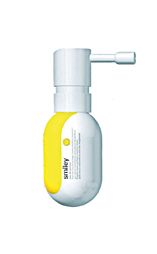Beauty Treatment: Mood Makeup
Can cosmetics influence the brain?
By Karina Grudnikov and Katherine Schreiber Cullen published May 3, 2011 - last reviewed on December 21, 2020
Beauty products are designed to make us feel better about ourselves. But can they do so by actually altering our brain chemistry? In a growing trend, cosmetics companies are boasting that their products can latch onto brain receptors and alter our moods. Though there isn't much scientific evidence to support such claims, these so-called cosmeceuticals still pack a bit of fun. —Katherine Schreiber

Physicians Formula's Happy Booster Bronzer
The brand claims its proprietary Happy Boost Blend (comprising omega-3-rich euphoryl, murumuru, and Arctic Rose derivatives) can mimic endorphins, the body's feel-good chemicals. Physicians Formula also attests that the sacha inchi oil and pink pepper extract in their product stimulate dopamine production in the brain.
Though omega-3 oils have been shown to lift some people's moods when consumed in food or supplements, Ronald Brancaccio, a dermatologist in New York City, doubts that their inclusion in a bronzer could have direct effects. "It's difficult for any compound to be absorbed into the bloodstream via the skin," he explains. Even with transdermal medications, like nicotine patches, "concentrations of active ingredients and dosage delivery are worked out very carefully," he adds. Still, a hit of bronzer might boost self-confidence—sun-kissed cheeks, sunny mood.

Firmenich's Smiley Perfume
This citrus and bergamot-scented fragrance purportedly stimulates the same brain receptors that induce euphoria—it's marketed as "the world's first antidepressant perfume." The makers attribute the effect to the fragrance's main chemical components, theobromine and phenylethylamine (the same mood-boosting compounds found in cocoa beans).
"If you wear a smell you like, it will make you happier," says Alan Hirsch, director of the Chicago-based Smell and Taste Treatment and Research Foundation. Smells associated with positive memories lift your spirits by reminding you of pleasant times. But no perfume can consistently elevate mood. "I think the placebo effect is at work here," adds Robert I. Henkin, director of Washington, D.C.'s Taste and Smell Clinic.

Kroia Chromotherapy's Active Foaming Moisturizer
Developed by nutritionist Karla Farach, this moisturizing cream hinges on the homeopathic practice of chromotherapy: exposing yourself to colors associated with certain "energies" that alter your frame of mind. Each moisturizer (available in blue, yellow, and pink) is infused with ingredients that emit particular wavelengths of light, like pomegranate and primrose extract, or chamomile and lavender oil.
"The combination of these ingredients creates synergy," Farach contends, "which is transmitted by applying the product to the skin," inducing calmness or invigoration. Brancaccio is skeptical: "It seems like a stretch to say that a product would change your mood because its ingredients contain some unmeasurable energy." The product's real perks lie in its tangible qualities: It leaves skin sweetly scented and baby smooth.
Unfair Flair
Do your good looks cloud your political and social opinions? Hotties have fewer qualms about social inequality, finds a new study from Brunel University. Self-perceived attractiveness in both sexes, plus a muscular upper body in males, negatively correlates with egalitarianism—which includes ideas about worthiness and social dominance. Beautiful people have benefited from inequality since ancient times, says researcher Michael E. Price: "If you are physically attractive, you have more access to resources and are valuable as an ally and a mate." Earth to beauties: Turning a blind eye to injustice is straight-up unattractive.—Karina Grudnikov
